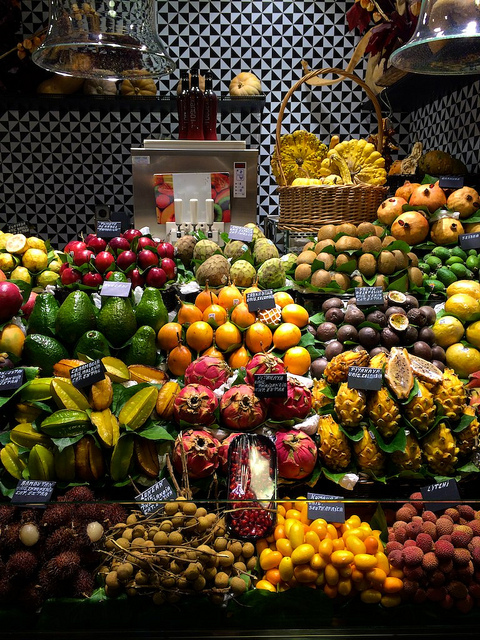Food
These foods will lower your risk of heart disease

Bombarded with contradictory media reports on the ever-changing landscape of nutrition research, it’s difficult for anyone to know which fats and other foods they should eat, and in what quantities. (Photo by Ania Mendrek/Flickr, CC BY-ND 2.0)
Low-fat or low-carb? Butter or margarine? Avocado oil or coconut oil? Bombarded with contradictory media reports on the ever-changing landscape of nutrition research, it’s difficult for anyone to know which fats and other foods they should eat, and in what quantities.
We know that cardiovascular diseases (CVD) are the No. 1 cause of death globally and a leading cause of death in Canada. We also know that 80 per cent of chronic disease could be alleviated by following a healthy diet, avoiding tobacco, maintaining a healthy weight and getting regular exercise.
In an effort to follow a healthy diet, it’s easy to focus on individual nutrients. This serves us well for preventing nutrient deficiencies (think Vitamin C and scurvy). It doesn’t work so well as a strategy for avoiding chronic disease.
We eat food — ideally three to six times per day — not individual nutrients. So, when it comes to fats, we really need to focus on dietary patterns.
Fats and cardiovascular disease
There have been many studies looking at diet and its impact on the heart. When the scientific community has examined the link between saturated fat (in butter, meat fat, chicken skin and high-fat dairy products) and risk for cardiovascular disease, conflicting findings have emerged.
One review of the evidence showed that saturated fat has no relationship with CVD. However, this research didn’t consider what nutrient replaced saturated fat. Another review of the evidence demonstrated that the risk for CVD varies depending on what nutrient replaces the saturated fat.
When you eat trans fat — found in donuts and other store-bought baked goods, deep-fried foods, partially hydrogenated oils and vegetable oil shortening — instead of saturated fat, your risks of CVD increase. However, if you eat unsaturated fats — oils that are liquid at room temperature, especially polyunsaturated fats such as vegetable oils, nuts, seeds and fish, and carbohydrates from whole grains —instead of saturated fats, your risk of CVD decreases.
Whether you eat mostly saturated fats or sugar and refined starches (such as white rice, white bread and processed cereal) doesn’t appear to matter when it comes to heart disease. According to this research, the risks are about equal.
Coconut oil or olive oil?
The effects of coconut oil as a replacement for other dietary fats, such as butter, olive oil and canola oil, have not been studied for the effects on CVD. The impact of coconut oil on heart disease risk remains unknown.
We do know, however, that coconut oil raises some risk factors for CVD — it increases cholesterol compared to polyunsaturated fats (in vegetable oils, nuts, seeds and fish) that lower cholesterol.
Olive oil, on the other hand, when consumed as part of the high-fat “predimed diet pattern” (PDP) referenced below, has been shown to reduce cardiovascular disease. It’s important, then, to look at dietary patterns rather than individual fats.
Plant-based diets are best
Our western diet pattern includes sugar-sweetened beverages (pop, flavoured juice and coffee drinks), refined carbohydrates (commercially baked goods like muffins and doughnuts which are sources of trans fat), processed meats (salami, pepperoni and bacon) and combination foods (for instance pepperoni pizza and bacon cheese burgers).
Unfortunately, Canadians are consuming sugar, trans fat and processed foods in quantities that have been shown to increase CVD risk.
There is substantial evidence that a Mediterranean diet pattern (MDP) reduces cardiovascular disease. This involves eating plant foods — vegetables, fruit, whole grains, legumes and olive oil — plus fish and a moderate amount of wine. Meat, butter, cream, sugar-sweetened beverages and commercial baked goods are eaten in limited quantities.
Men with heart disease in the Lyon Diet Heart Study following the Mediterranean diet had a 30 per cent reduction in secondary heart events. Participants following the pridimed diet had a 30 per cent reduction in the primary prevention of CVD. The diet plans are similar and are high in fat from additional nuts or olive oil.
Vegetarian diet patterns are mostly plant-based, but can include small amounts of animal foods, such as dairy products, eggs and fish. Communities known for their longevity and low incidence of heart disease include Sardinia in Italy, Icaria in Greece, Okinawa in Japan and Loma Linda in California. These so-called “blue zones” all follow healthy lifestyles including vegetarian diets. Their staples are vegetables and fruit, whole grains, legumes and nuts and may include fish. Meat is consumed only on special occasions.
When combined with intensive exercise, another plant-based diet followed in the Lifestyle Heart Trial demonstrated reversal of heart disease. This was a very low-fat vegetarian diet (with fat accounting for only 10 per cent of total calories) that consisted of vegetables, fruit, whole grains and legumes with small amounts of non-fat dairy products.
In these diet patterns, fat content ranges from 10 per cent to 40 per cent of total calories. This shows that both low-fat and high-fat diets lower risks of CVD — if they are plant-based.
Eat cruciferous veg and citrus fruits
We should all be eating five to 10 servings of fruits and vegetables daily. Research shows that five servings of vegetables and fruit per day are protective against CVD, but 10 servings of vegetables and fruit per day lower heart disease risk by 24 per cent.
One serving is equivalent to a medium-sized fruit, a half-cup of chopped fruit or berries, a quarter-cup of dried fruit, a half-cup of cooked or raw vegetables and one cup of salad greens. About 40 per cent of Canadians over the age of 12 consume at least five servings of vegetables and fruit per day.
Cruciferous vegetables — such as broccoli, cabbage, green leafy vegetables, spinach and kale — along with beta-carotene-rich fruits and veggies like tomatoes, carrots and squash demonstrate the most benefit. As do apples, pears, berries and citrus fruit like oranges.
Serve up whole grains and legumes
We should also be eating at least three servings per day of whole grains. The research shows this lowers CVD risk by 19 per cent.
What’s a serving? It can be one slice of whole grain bread, half a slice of whole grain pita bread, one bowl of cereal, one third of a cup of cooked grains like barley, bulgur, brown rice and quinoa or half a cup of cooked whole grain pasta or corn.
Legumes also reduce our risk of heart disease. The research shows that four servings of legumes per week lower CVD risk by 14 per cent.
We should be eating three to four servings per week — of black beans, garbanzo beans, kidney beans, navy beans, soy beans, lentils or dried peas. One serving is measured as three quarters of a cup of cooked legumes.
Healthy fats in fish, nuts, seeds and oils
Finally, back to the fats. We can obtain the good fats our body needs by eating fish, nuts, oils and seeds.
Eating fish at least two to four times per week reduces CVD risk by 17 per cent, according to research. One serving of fish is defined as three ounces of cooked salmon, mackerel, herring, sardines, tuna, halibut and other fish.
Eating at least three servings of nuts per week is a good idea. Just one quarter cup of nuts consumed four times weekly reduces CVD by a whopping 24 per cent, according to research. One serving of nuts is defined as one quarter cup of walnuts, almonds, hazelnuts, pecans, cashews, peanuts or pistachios. Or two tablespoons of natural almond, cashew or peanut butter.
Seeds — such as pumpkin, flax, chia, sunflower and sesame seeds — and butters made from sesame and sunflower seeds also lower CVD risk. Olive oil, canola oil, peanut oil, avocado oil and soybean oils all lower CVD risk as do avocados, which improve your cholesterol profile.
Enjoy minimally processed plant foods from nature most of the time. They are better for us. And, as a bonus – eating them is better for the planet too.
———
This article was originally published on The Conversation.





















